How to conduct interviews with survivors of conflict-related sexual violence (CRSV) and how journalists can support themselves when working with sensitive topics was covered at the training called Covering CRSV: What Journalists Need To Know? It was organized by the National Union of Journalists of Ukraine (NUJU) for Kherson media men and women; however, journalists from the Donetsk Region, Kharkiv Region, Kyiv Region, and Kyiv also joined the class on media coverage of CRSV.
NUJU‘s First Secretary Lina Kushch drew attention to the fact that, according to the Prosecutor General’s Office data on the investigation of war crimes for the first half of 2024, there are data that six people have received reports of suspicion. Three have been convicted of CRSV crimes.
“There are not enough stories like this made public now because not all women and men who survived CRSV are ready to talk about what happened to them. Our journalistic mission is to carry out such work so that as many people who have survived CRSV as possible are ready to testify about their experience so that the evil is punished,” Lina Kushch emphasized.
The program manager of the Dr. Denis Mukwege Foundation, Mariia Yefimchuk, shared data on the situation with CRSV.
She drew attention to the fact that sexual violence is used as a weapon of war because of existing gender norms in many societies. Impunity for offenders also plays a role. In the history of the International Criminal Court, there is only one case where a person was convicted of sexual slavery. This case set a precedent for judicial investigation in CRSV cases. However, there is still much work to be done in this direction. Mariia Yefimchuk said that in Ukraine, the Dr. Denis Mukwege Foundation works at the invitation of the government. It is about comprehensive assistance to injured persons.
Regarding informing the public and raising awareness, Mariia Yefimchuk drew the attention of journalists to their role in this process.
“It is you who have the power to inform the public, to tell, to raise awareness about the CRSV problem, about the specifics of work, communication with affected persons. You have the power to change society’s attitude to the topic of CRSV. To those affected by CRSV, you can influence the reduction of stigma, rejection, or silence about this topic. Which is a very desirable result of your work, along with interviewing the victims sensitively, sympathetically, ethically and not exposing them to additional danger,” noted Mariia Yefimchuk.
Liudmyla Huseinova, a human rights defender, citizen journalist, former political prisoner, and communications director of SEMA Ukraine, gave journalists advice on covering the topic and conducted a class during which various situations that could accompany an interview were simulated.
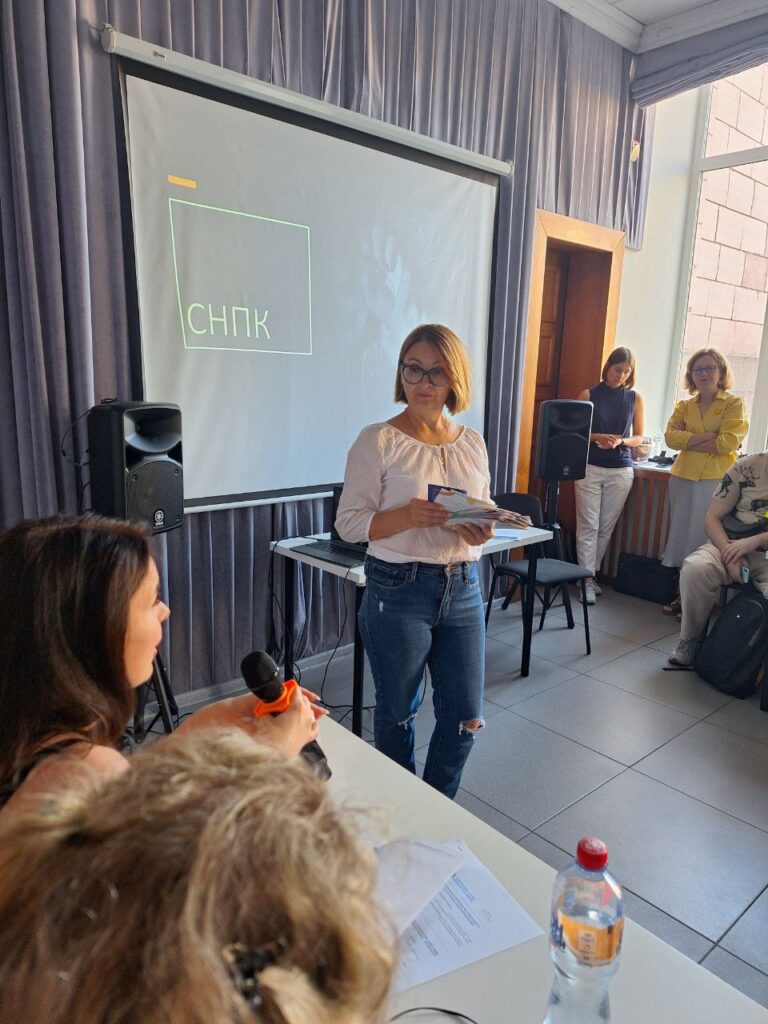
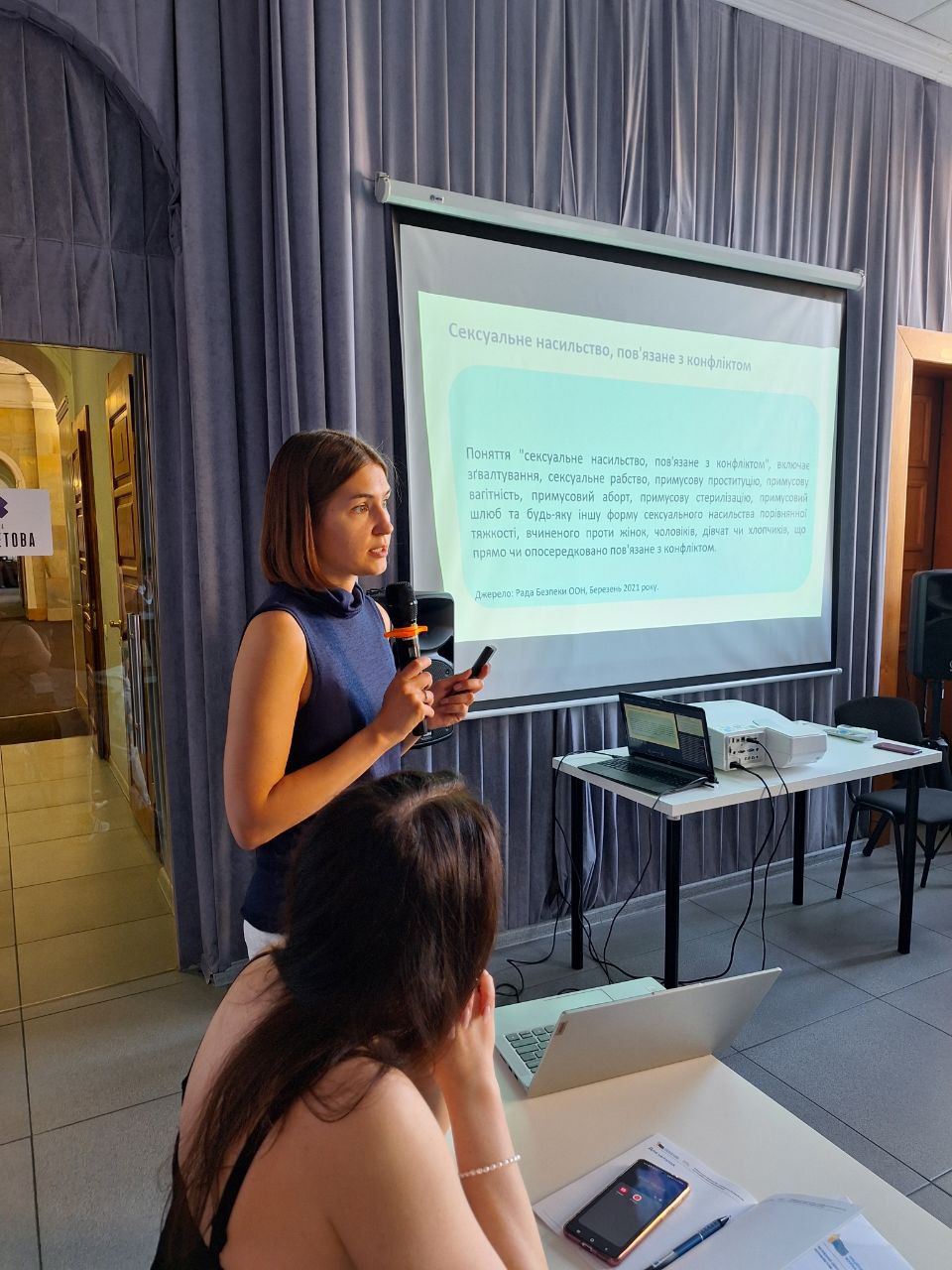
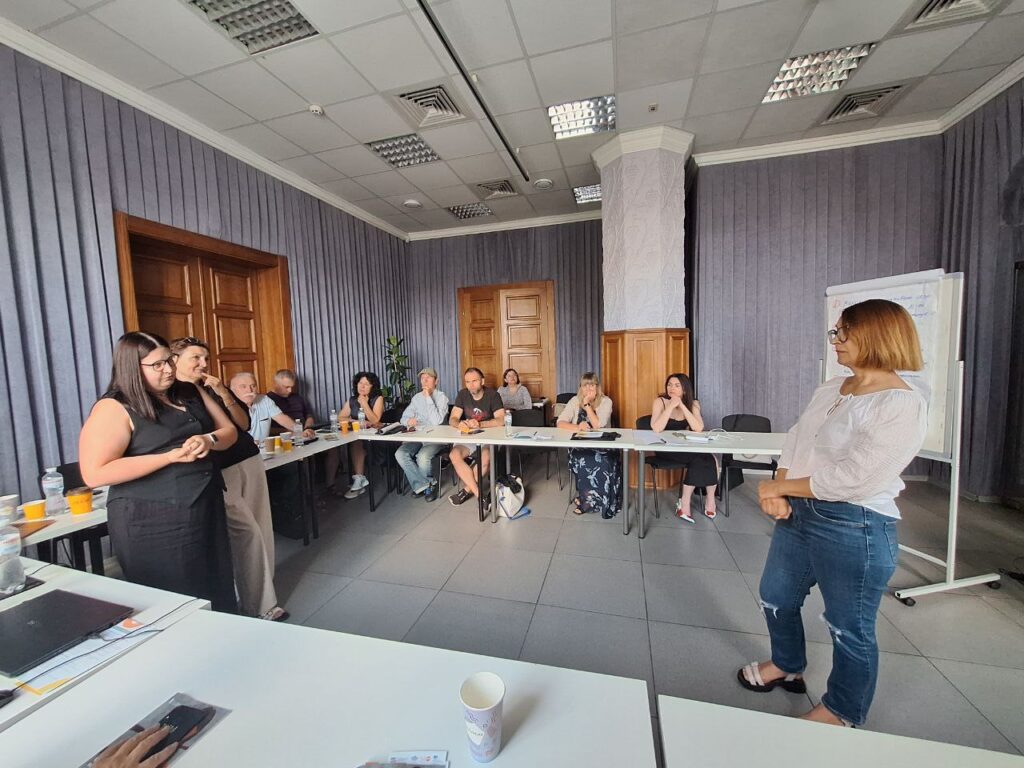
She drew attention to the fact that thanks to publications that appear on radio and television, people living in temporarily occupied territories also receive this information.
“I am personally glad that you came here and that you have the desire to talk about it. Covering CRSV issues is not only an interview. This is generally about what CRSV is. Because sometimes, even CRSV survivors don’t realize it. Almost every month, after more or less loud interviews or comments, I receive news from the occupied territories asking for help. For example, from Donetsk, after one of these publications, they wrote to me about a woman who is in captivity, asking for help. We deliver information to the occupied territory. We convey information that we will not remain silent and that we help people who have undergone torture and CRSV. We also inform the executioners that we will demand their punishment. I really hope that exactly this will make the executioners a little so that they do not do such terrible things. Awareness of the punishment should be a deterrent for those who do it,” Liudmyla Huseinova emphasized.
Journalists who came to the training shared their stories of working with the CRSV topic and told what they expected from the training.
“The interview with Liudmyla Huseinova was my first interview on this topic. Sometimes it was simple, sometimes it was difficult, but I believe that you and I managed to do everything. Simply because I have been doing interviews all my professional activity. But I wanted not to offend; I really wanted to find the right words for Liudmyla. I understood that, on the one hand, I had to get cool information and make a cool headline, maybe shocking. But I also understood that I could hurt my heroine again. So, it was not easy to find this middle ground – not to offend and to get powerful information that will touch the viewer. He will watch this interview,” said Ukrinform News Agency journalist Tetiana Kulyk.
Olha Liashok, a correspondent of the Kherson branch of Suspilne TV channel, noted that she had not yet worked with this topic.
“We know that there are many such cases. But this is information from people who are now in the occupied territory. But they cannot talk about it either physically, or the person who experienced it is not ready to talk about it – it is very painful and difficult. This is a difficult topic, but we know that it is very relevant, and we received very useful information at the training,” noted the journalist.
Oksana Naumova, a journalist from Kherson, has been living in Kyiv for two years, working for the publications Detektor Media and Novyi Den. She noted that she has not written about CRSV yet but wants to be prepared if she has to address this issue.
Maksym Zabielia, the editor of the city newspaper, Ridne Misto, from Myrnohrad, Donetsk Region, said that since the city is very close to the front line, a lot of victims from the occupied territories come here. Journalists have been documenting war crimes committed by the russian federation for two years. However, we have not come across any cases of sexual violence among the documented stories. But this does not mean that they are not there.
According to Yevhen Tkachenko, a co-owner and journalist of the information resource vkorin.com.ua from Nizhyn, Chernihiv Region, people are not yet ready to share their experiences.
“We talked with the residents of the de-occupied territories – Novyi Bykov, Nova Basan. Of course, we recorded the interview, but so far, we have not written about sexual violence,” Yevhen Tkachenko noted.
Representative of the all-Ukrainian magazine Politics. Law. Life and public figure Vladyslav Peskov noted that he worked with the CRSV topic, preparing analytical materials, and emphasized that the topic is quite sensitive.
Kharkiv journalist Halyna Polovyk returned to television journalism during the war, and currently represents the newsroom of the video content Hromada Hrup of the Kharkiv Press Club.
“I haven’t worked with the CRSV topic but spoke with people who are in the occupied territories. Colleagues said that people in Ukraine are not ready to talk about CRSV. And that is really so. Our Kharkiv Press Club has released 60 short documentaries about russian crimes in the Kharkiv Region in one year. Among them, in only one film, the mother told about how they were in the torture chamber – son, daughter, and daughter-in-law. It is very difficult to shoot such films and communicate with people, but it is necessary,” stressed Halyna Polovyk.
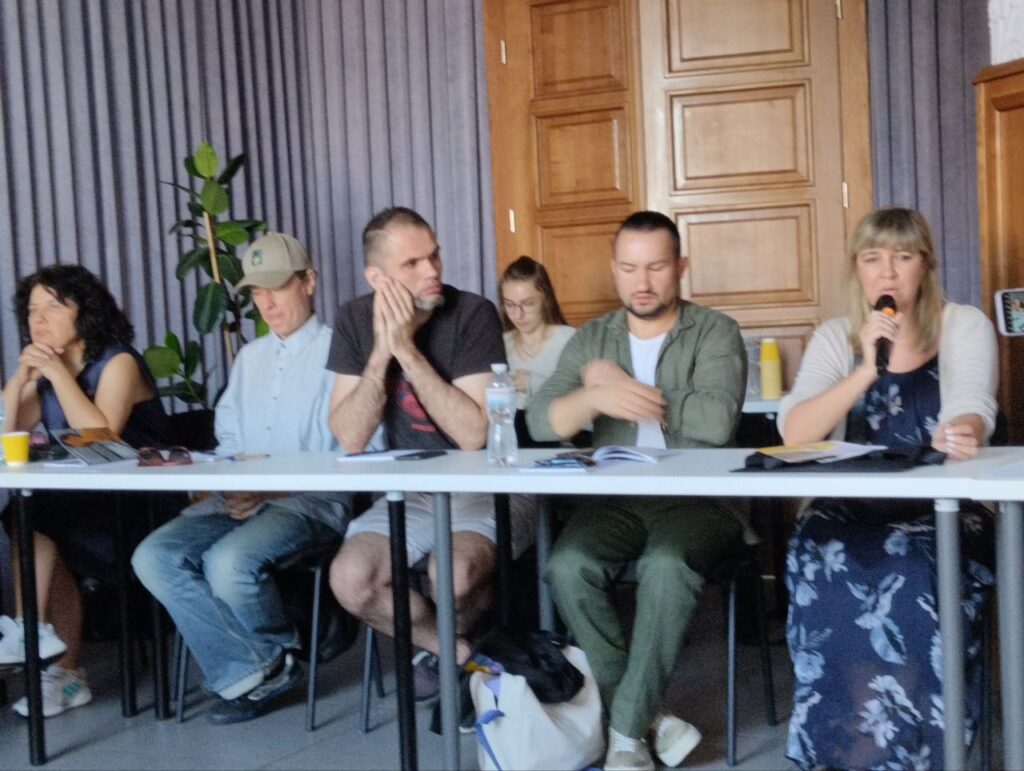
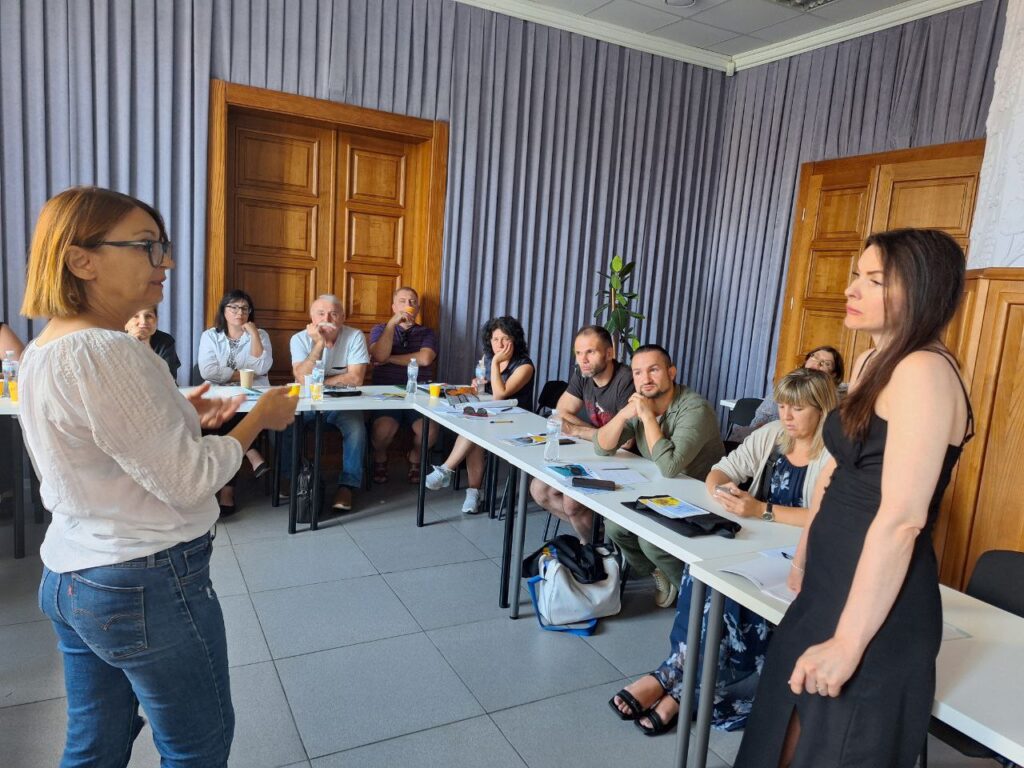
Oleh Baturin, a journalist from Kherson who works at the Crimean Center for Investigative Journalism and the Public Interest Journalism Laboratory, has been documenting war crimes for over two years and has been investigating war crimes committed by russians in the temporarily occupied territories for over seven years.
“I had to face cases of sexualized violence – mainly against men, but also against women. I wrote about it many times, even when it was not talked about publicly. But I always focus on the very fact of war crimes, that is, the stories of the victims are separate episodes,” Oleh Baturin noted.
Valerii Dolyna, the board chairperson of the Kherson regional organization of the NUJU, noted that the information provided at the training is useful not only for journalists who write or plan to write on the topic of CRSV but also for the board of the regional organization of the NUJU, from which it may be appropriate to adopt certain recommendations. However, it is not easy because Kherson journalists and the management of the regional organization, given the situation in the region, are currently scattered throughout Ukraine and abroad.
Tetiana Vysotska is the host of the news and social project of the STB TV channel and is originally from the Kherson Region. She said she met and talked in the television studio with Liudmyla Huseinova, who told her a difficult story.
“I can assure everyone that working with people who survived captivity and violence is very difficult. I constantly try to analyze and improve my skills. That’s why I’m here. I also know about the terrible details of what our compatriots, the people of Kherson, experienced in a Nova Kakhovka basement. A journalist should know how to perceive, experience, listen to, reflect on, and support. In my opinion, a journalist who works with such people faces a lot of tasks. Thank you for this event; it is really very important,” noted Tetiana Vysotska.
“I also thank you for this event. After all, there are cases of CRSV, but people do not talk about it; they are ashamed. Only recently, 4-5 ago, they started talking about violence in the family. And this is difficult. Not everything is recorded, of course, because many people live in small towns, where if something is said, it is the person’s fault. And people are afraid. They need to be given some push so that they understand that it is not a shame to talk about it, for the person who committed it will be punished. I want to talk about it and write; that’s why I’m here,” said Liudmyla Zahainova, the leading consultant of Donechchyna TV multimedia projects.
Olena Khalik, a resident of Nova Kakhovka and the editor-in-chief of the News LIVE [Novyny LIVE] platform, had to leave the temporarily occupied city.
“We still have a lot of work ahead of us. We now have many occupied territories where we have no idea what is happening there. Therefore, we must be ready to communicate with people correctly, to cover it correctly, and to understand that every crime must be punished,” emphasized Olena Khalik.
Oleksandr Hunko, a compatriot of Olena Khalik, the editor-in-chief of the Nova Kakhovka.city website, spent six months in the occupation, survived detention, and spent three days in solitary confinement.
“I myself have not experienced CRSV, but I know I know people who visited the “basement” in Nova Kakhovka, how they were arrested – both men and women. But I still don’t know how to write about it, because our city is small, and it is unlikely that people will want to talk about it. But it is necessary to prepare for this. Thank you for this opportunity to undergo training. However, I think that as long as Nova Kakhovka is occupied, it is unlikely that we will write about it,” noted Oleksandr Hunko.
Yevheniya Virlych, the editor-in-chief of the online resource Kavun.city and coordinator of the Kherson network Rayon.in.ua, spent more than four months in the occupation in Kherson and has experience communicating with captive Ukrainians.
“I have experience communicating with people who have survived captivity and violence, but I have never described it myself. Because, apparently, the pain of the occupation that we experienced, the experience of shutting the mouths of those who wrote a lot in groups during the occupation, probably restrains us from daring to write on such topics. Thank you very much for such an event. I can only imagine how difficult it is to teach such a thing. We would like to embody the experience we have now in notes, in our heads, in publications. After all, many people need someone to report this crime and others to learn about it. So that the whole world knows how terrible crimes russia is committing, and that nothing has changed at all since the Battle of Baturyn in 1708,” Yevheniya Virlych emphasized.
Ivanna Daniuk, a representative of the Visnyk Pereyaslavshchyny newspaper and the website Pereyaslav.city from the Kyiv Region, said that publications with the CRSV topic did not work, but the journalist is now working on the topic of sexual violence during the war in the unoccupied territory.
“I have already recorded the interview. Now, I want to know how to describe it correctly, how to present this story, and what to pay attention to. Because the topic is not easy, the interview was very difficult, to be honest. After all, I had never been to such training before and had to independently find ways to learn how to ask a question, whether it is possible to ask this or that question,” says Ivanna Daniuk.
Anatolii Yayitskyi, deputy editor-in-chief of the Kherson newspaper, Novyi Den, noted that the newspaper has written on this topic several times.
“We all know how interesting it is to read such materials and how difficult it is to prepare them. Therefore, the most important thing at this seminar is to gain practical knowledge on this subject, Anatolii Yayitskyi emphasized.
Correspondent of the Kherson newspaper, Hryvna, Sofiya Serebriakova noted that the topic of CRSV is no less painful, no less closed, and no less difficult to cover than the topic of AIDS patients, which she covered, and expressed hope that the current training will help media workers in the future.
Sonia Hryhorchuk, the correspondent of the Rada channel, spoke about her experience covering the topic of sexual violence.
“I came to the conclusion that no matter how much you prepare, at some point, you still get lost during a conversation with a person. It hurts somewhere, and there is not a single thought left in your head. And even when my interlocutor was very open to revealing any details of what happened to him and what experiences he went through, you still think about how to ask questions so as not to repeat this trauma. Therefore, it is important to learn not only how to speak to the camera but also how to speak outside the camera – while you are framing, while you are going to the shooting location, how to adjust the person to you so that he knows that he is with you in a safe space,” noted Sonia Hryhorchuk.
NUJU information service
Photo by Larysa Portianko

 THE NATIONAL UNION OF
JOURNALISTS OF UKRAINE
THE NATIONAL UNION OF
JOURNALISTS OF UKRAINE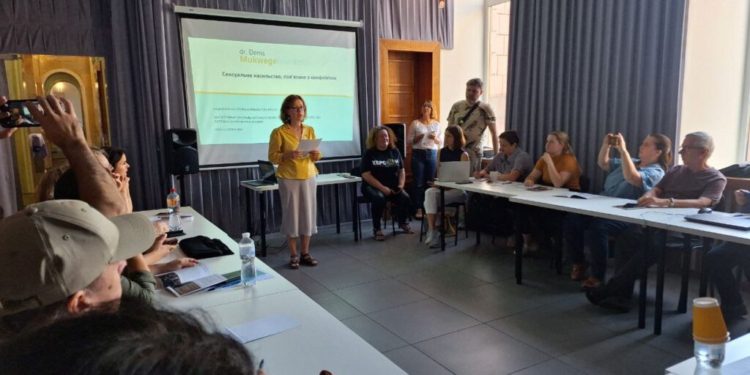
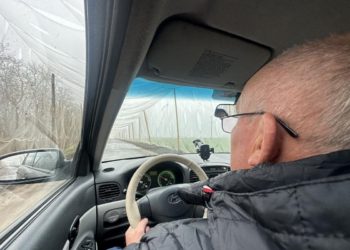
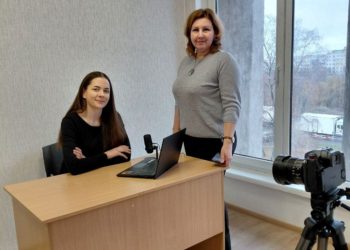
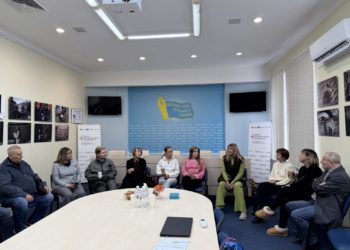













Discussion about this post